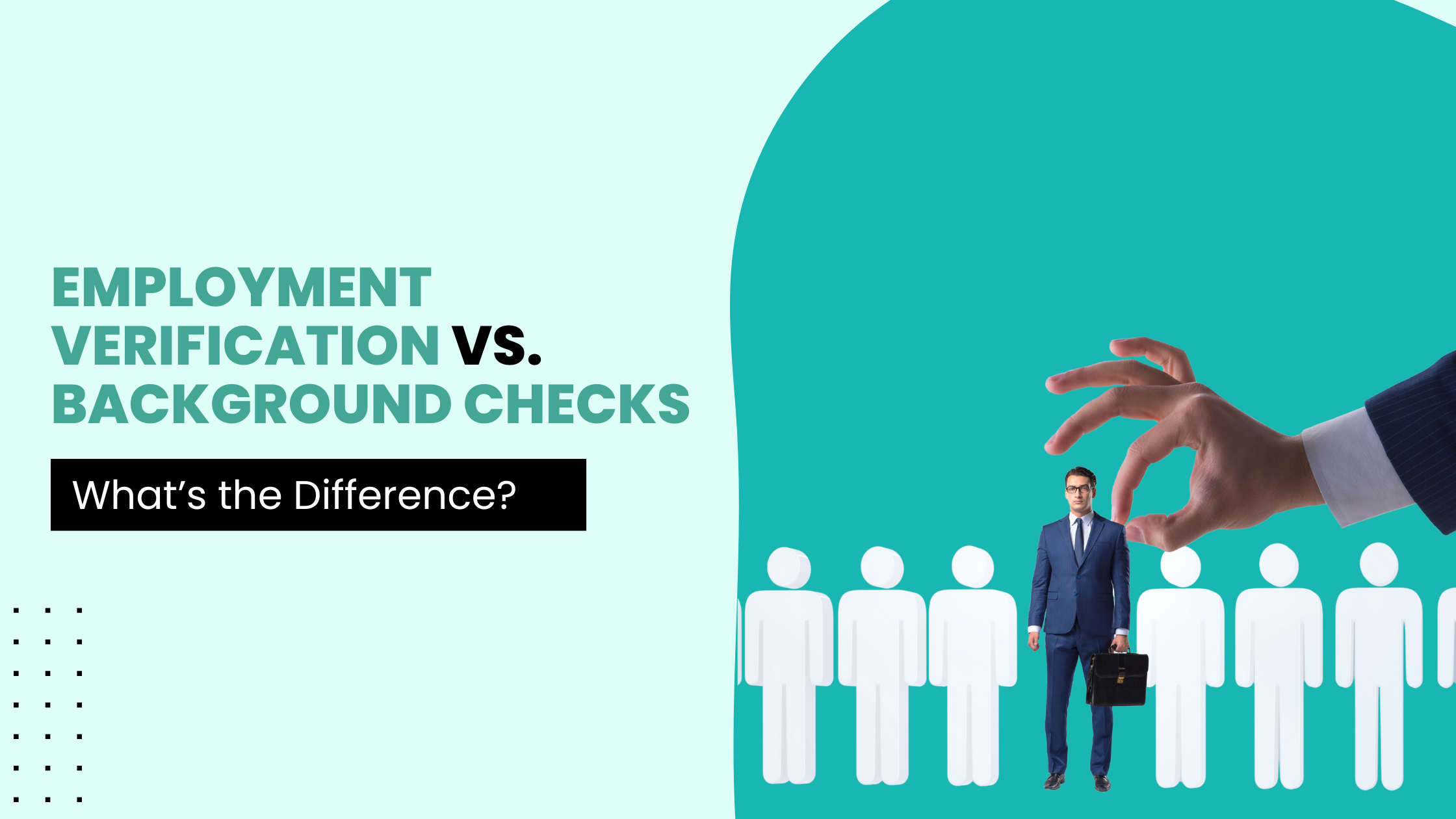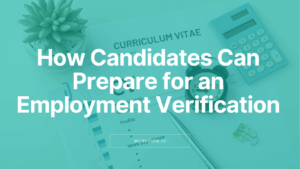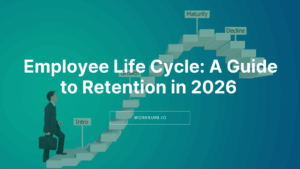Employment verification and background checks are both used during the hiring process, but they are not the same. Employment verification confirms a candidate’s job history. While background checks refer to looking into criminal records, education, and other details.
Many employers use both. But knowing when and why to use each helps reduce risk and improve hiring decisions. Moreover, understanding the difference can make the process more transparent and easier to navigate for candidates.
This guide outlines what each process involves, how they differ, and when each is most appropriate. Let’s start with a basic understanding of both.
Table of Contents
What is Employment Verification?
Employment verification is the process of confirming a candidate’s work history with previous employers. It typically includes checking job titles, dates of employment, and reasons for leaving. Some employers also verify salary or responsibilities, depending on local laws and internal policies.
This verification is usually conducted by contacting previous employers directly, often via email or phone. Some organizations outsource the task to third-party verification services that specialize in this domain. The objective is to ensure that the candidate’s professional history is truthful and consistent with what has been presented during the hiring process.
What is a Background Check?
A background check is a broader investigation that looks into various aspects of a candidate’s personal, professional, and in some cases, financial history. While employment verification may be included as part of this process, background checks go much further and may include:
- Identifying any history of criminal activity
- Confirming legal name and identity
- Evaluating financial responsibility (relevant for financial roles)
- Validating academic qualifications
- Driving records for roles involving transportation or company vehicles
- Professional licenses and certifications
These checks are generally conducted by specialized background screening companies and require the candidate’s consent, especially in jurisdictions governed by regulations such as the Fair Credit Reporting Act (FCRA) in the United States or GDPR in Europe.
The goal of a background check is risk mitigation. Employers want to ensure they are hiring trustworthy individuals who will not pose legal, reputational, or security risks to the organization.
Key Differences Between Employment Verification and Background Checks
Although both processes help employers assess candidates, they differ in scope, purpose, and how they are conducted.
| Employment Verification | Background Check |
| Confirms where a candidate worked, their job title, and dates of employment. | Reviews a candidate’s legal, financial, and credential-related history. |
| Focuses only on past employment details. | May include criminal records, credit reports, education, and licenses. |
| Performed by HR teams or verification services. | Conducted by licensed background screening firms. |
| Often informal; consent may not be documented. | Requires written consent from the candidate. |
| Used to confirm the candidate’s experience. | Used to assess overall risk or compliance with legal requirements. |
Employment verification is specific and fact-based. It confirms that the candidate has the experience they claim. A background check is broader and is used to evaluate whether a candidate poses any legal, financial, or reputational risk to the organization.
When Should Employers Use Each?
Selecting between employment verification and a comprehensive background check depends on the position, industry requirements, and the level of risk associated with the role. In some cases, employment verification alone may be adequate; in others, a broader screening process is necessary.
When Employment Verification Is Appropriate
Employment verification is suitable when the primary objective is to confirm a candidate’s previous work experience. This applies to roles where past job titles and tenure are the main indicators of suitability. Common scenarios include:

In such cases, verifying employment dates, titles, and responsibilities is often sufficient to validate a candidate’s background.
When a Background Check Is Necessary
A full background check is recommended when the position carries legal, financial, operational, or reputational risk. These checks help employers make more informed decisions and ensure compliance with regulatory standards. Background checks are generally required for:

In practice, many employers choose to conduct both employment verification and a background check, particularly for critical or high-stakes roles. This layered approach ensures that both experience and overall candidate suitability are properly assessed.
Legal Considerations and Compliance
Both employment verification and background checks must comply with applicable laws and regulations. These requirements are in place to protect the rights of candidates and to ensure that employers follow fair and transparent hiring practices.
Candidate Consent
In most regions, employers are required to obtain explicit written consent before initiating a background check. This includes checks conducted by third-party screening firms. While employment verification may not always require formal consent, it is best practice to inform candidates that references or former employers will be contacted.
Fair Use of Information
If a background check reveals information that may influence a hiring decision, employers must follow proper procedures before taking action. In the United States, for example, the Fair Credit Reporting Act (FCRA) mandates that candidates be given notice, a copy of the report, and an opportunity to respond before any adverse decision is made. Similar requirements exist in other jurisdictions, including under GDPR in Europe.
Data Privacy and Security
Personal data collected during the verification or background screening process must be stored and handled securely. Employers must ensure that data is only accessed by authorized personnel and is used solely for employment-related decisions. Retention of this data should follow local data protection laws, and unnecessary or outdated records should be disposed of responsibly.
Equal and Consistent Application
Screening procedures should be applied uniformly to all candidates for a given role. Selectively applying background checks or verifications based on assumptions, personal judgments, or demographic characteristics can result in claims of discrimination or unfair treatment. Employers should have clear, written policies that define when and how checks are conducted.
Using Trusted Providers
When outsourcing background checks or employment verifications, it is essential to work with providers that follow legal and ethical standards. Reputable firms ensure that all procedures comply with national and regional laws, and that data is collected and reported accurately.
Conclusion
Employment verification and background checks are both important tools in the hiring process, but they serve different purposes. Choosing the right approach depends on the role, industry, and level of responsibility involved.
For some positions, confirming past employment is sufficient. For others, especially those involving regulatory requirements or high trust, a full background check may be necessary.
Employers who understand the distinction can make more informed hiring decisions and reduce the risk of delays, errors, or compliance issues. Candidates who know what to expect can better prepare and engage in the process with confidence.
Related Articles:
What Information Can be Released for Employment Verification?
What is Employment Verification and Why it Matters?
Frequently Asked Questions (FAQs)
1. Is employment verification the same as a background check?
No. Employment verification confirms previous job details, while a background check includes broader information such as criminal records, education, and credit history.
2. Can an employer run a background check without my permission?
In most jurisdictions, written consent is required before a background check can be conducted.
3. Will a background check show gaps in employment?
A background check may reveal employment dates, but it won’t always explain gaps. It’s best to proactively address any gaps during the interview process.
5. How long does employment verification usually take?
It typically takes 1 to 5 business days, depending on how quickly former employers respond and whether a third-party service is used.





